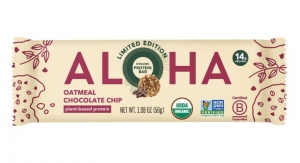Mike Montemarano, Associate Editor 05.06.21
The Institute of Food Technologists (IFT), in collaboration with the University of Massachusetts, hosted a two-day virtual conference to examine the shift in consumer eating and shopping trends from pre-pandemic onward and provide insights on the “next normal.” New approaches were identified to better leverage the 2020-2025 Dietary Guidelines, and encourage healthy habits among consumers as the country begins to reopen.
“Our research shows that most consumers see their health as a priority and claim to eat healthy most of the time, however to many of them, healthy simply means ‘fresh, but has no bad stuff’” Lynn Dornblaser, Mintel Director of Innovations and Insights, said. “As an example, while the 2020-2025 Dietary Guidelines have cut back recommended sodium and sugar consumption, these concerns are not trending among consumers.”
Dornblaser said that there is a knowledge gap among consumers, when it comes to perceptions of foods that are ‘healthy’ or ‘unhealthy.’ Dornblaser said that there will be a likely increase of interest in immunity-boosting foods, snacking, and indulgent food consumption. Along with health, consumers are increasingly concerned about strengthening their immunity, with 53% of respondents listing that as a “higher priority” in 2020.
“With consumer interest in health and nutrition at an all-time high, this is an important moment for the science of the food and nutrition community and healthcare professionals to communicate the importance of the Dietary Guidelines,” IFT President Noel Anderson, PhD, said. “We have an opportunity, especially through food science and technology innovations, to enable consumers to enjoy healthy foods in a new way.”
Stephanie Fu, USDA Center for Nutrition Policy Advisor, shared consumer research on healthy eating habits across all life stages. The research indicated that consumers need easy-to-understand nutrition recommendations, which is why USDA and HHS adopted “Start Simple with my Plate” as their message for the 2020-2025 Dietary Guidelines for Americans.
“It is a concept that allows consumers to incorporate healthy eating at any stage of life and make small tweaks that shift their food choices to a more healthful eating pattern. The Guidelines emphasize that small changes matter and consumers can begin making these changes at any point in their life to improve health. Tying this message into MyPlate is an effective framework for encouraging healthy eating patterns,” Barbara Schneeman, PhD, chair of the 2020 Dietary Guideliens Advisory Committee, said.
Consolidating Efforts
Discussing the “State of the Plate,” IFT brought together a panel of nutrition experts, food scientists, and a behavior expert to examine these trends further. The panelists emphasized the importance of bringing stakeholders across sectors of the industry to the table when it comes to consumer education.
The group also ascribed lack of knowledge or resources as a reason for insufficient access to federal nutrition programs, concluding that a collaborative effort among food scientists, nutrition experts, physicians, and other healthcare professionals could better equip people to adopt healthier eating patterns.
Bill Aimutis, executive director of the North Caroline Food Innovation Lab, and Megan Bame, extension associate of North Carolina State University, spoke about the potential for technical advances to encourage greater fruit and vegetable consumption. Bame said that cultural and financial barriers in the United States limit access to fresh produce, however, an increase in produce consumption could save the U.S. billions of dollars in medical costs and improved quality of life. They mentioned technologies such as the CRISPR/Cas9 Genome editing technique, which are being developed to improve the shelf life and quality of fresh and minimally processed fruits and vegetables.
Eric Decker, head of the Food Science Department at University of Massachusetts, discussed how a transition to plant-based protein could serve as a solution to the fact that Americans lack access to low-sodium or low-fat proteins. Plant-based options have become more popular and easier to access – Mintel consumer research indicates that the plant-based claim exceeded the vegetarian claim in new product introductions for the first time in 2020, fueled by the popularity of healthiness, lower energy density, and ethical and sustainable sourcing attributes, all of which are lacking in animal products.
The event was funded by a grant from the Agriculture and Food Research Initiative of the National Institute of Food and Agriculture, USDA. More information on upcoming IFT events can be found here.
Mike Montemarano has been the Associate Editor of Nutraceuticals World since February 2020. He can be reached at mmontemarano@rodmanmedia.com.
“Our research shows that most consumers see their health as a priority and claim to eat healthy most of the time, however to many of them, healthy simply means ‘fresh, but has no bad stuff’” Lynn Dornblaser, Mintel Director of Innovations and Insights, said. “As an example, while the 2020-2025 Dietary Guidelines have cut back recommended sodium and sugar consumption, these concerns are not trending among consumers.”
Dornblaser said that there is a knowledge gap among consumers, when it comes to perceptions of foods that are ‘healthy’ or ‘unhealthy.’ Dornblaser said that there will be a likely increase of interest in immunity-boosting foods, snacking, and indulgent food consumption. Along with health, consumers are increasingly concerned about strengthening their immunity, with 53% of respondents listing that as a “higher priority” in 2020.
“With consumer interest in health and nutrition at an all-time high, this is an important moment for the science of the food and nutrition community and healthcare professionals to communicate the importance of the Dietary Guidelines,” IFT President Noel Anderson, PhD, said. “We have an opportunity, especially through food science and technology innovations, to enable consumers to enjoy healthy foods in a new way.”
Stephanie Fu, USDA Center for Nutrition Policy Advisor, shared consumer research on healthy eating habits across all life stages. The research indicated that consumers need easy-to-understand nutrition recommendations, which is why USDA and HHS adopted “Start Simple with my Plate” as their message for the 2020-2025 Dietary Guidelines for Americans.
“It is a concept that allows consumers to incorporate healthy eating at any stage of life and make small tweaks that shift their food choices to a more healthful eating pattern. The Guidelines emphasize that small changes matter and consumers can begin making these changes at any point in their life to improve health. Tying this message into MyPlate is an effective framework for encouraging healthy eating patterns,” Barbara Schneeman, PhD, chair of the 2020 Dietary Guideliens Advisory Committee, said.
Consolidating Efforts
Discussing the “State of the Plate,” IFT brought together a panel of nutrition experts, food scientists, and a behavior expert to examine these trends further. The panelists emphasized the importance of bringing stakeholders across sectors of the industry to the table when it comes to consumer education.
The group also ascribed lack of knowledge or resources as a reason for insufficient access to federal nutrition programs, concluding that a collaborative effort among food scientists, nutrition experts, physicians, and other healthcare professionals could better equip people to adopt healthier eating patterns.
Bill Aimutis, executive director of the North Caroline Food Innovation Lab, and Megan Bame, extension associate of North Carolina State University, spoke about the potential for technical advances to encourage greater fruit and vegetable consumption. Bame said that cultural and financial barriers in the United States limit access to fresh produce, however, an increase in produce consumption could save the U.S. billions of dollars in medical costs and improved quality of life. They mentioned technologies such as the CRISPR/Cas9 Genome editing technique, which are being developed to improve the shelf life and quality of fresh and minimally processed fruits and vegetables.
Eric Decker, head of the Food Science Department at University of Massachusetts, discussed how a transition to plant-based protein could serve as a solution to the fact that Americans lack access to low-sodium or low-fat proteins. Plant-based options have become more popular and easier to access – Mintel consumer research indicates that the plant-based claim exceeded the vegetarian claim in new product introductions for the first time in 2020, fueled by the popularity of healthiness, lower energy density, and ethical and sustainable sourcing attributes, all of which are lacking in animal products.
The event was funded by a grant from the Agriculture and Food Research Initiative of the National Institute of Food and Agriculture, USDA. More information on upcoming IFT events can be found here.
Mike Montemarano has been the Associate Editor of Nutraceuticals World since February 2020. He can be reached at mmontemarano@rodmanmedia.com.




























